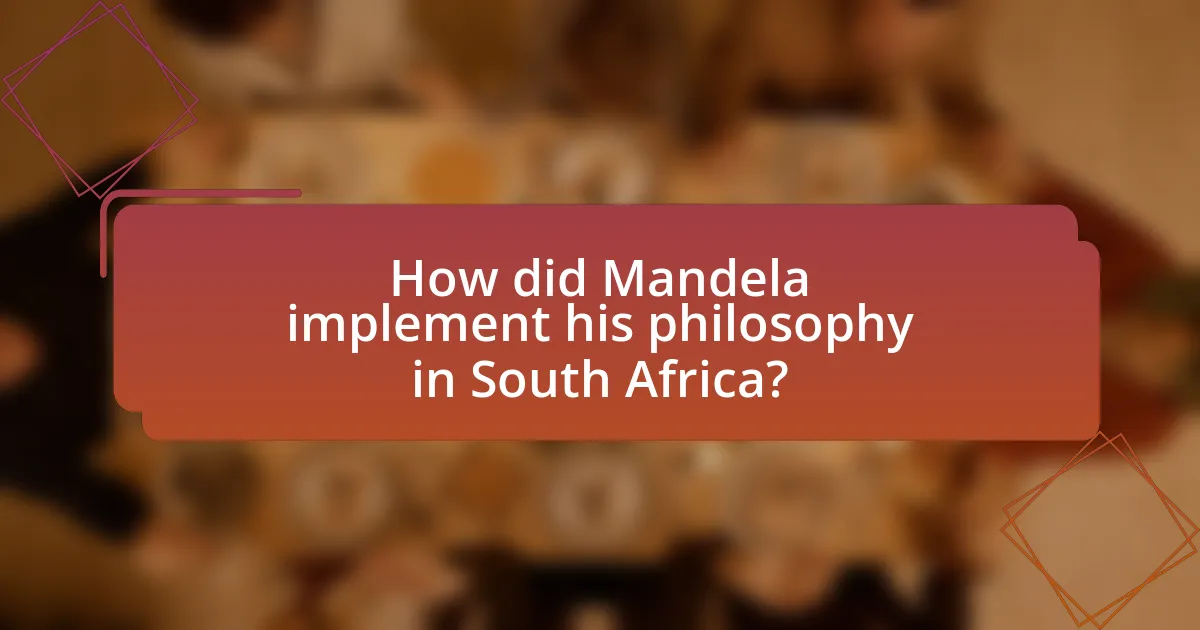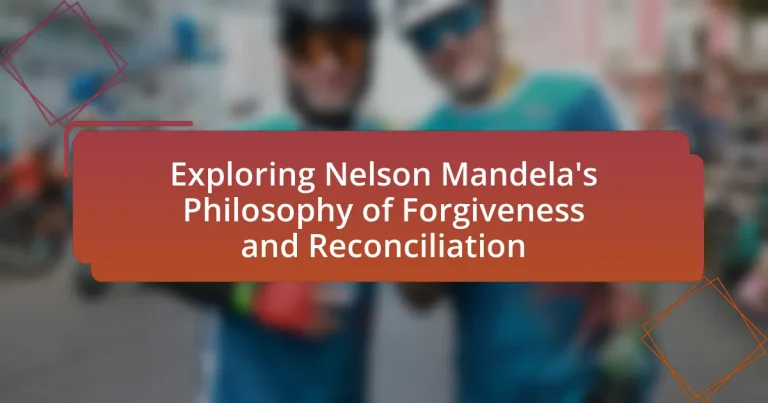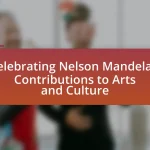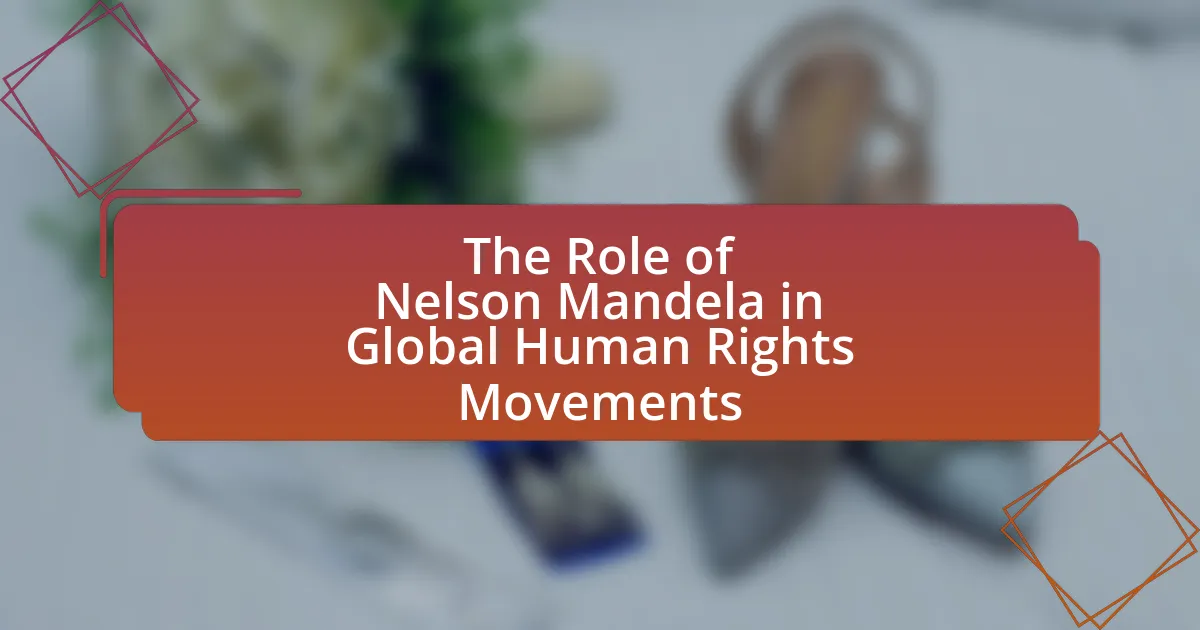Nelson Mandela’s philosophy of forgiveness and reconciliation emphasizes the necessity of healing and unity in a divided society. Shaped by his experiences with apartheid and imprisonment, Mandela advocated for restorative justice over retribution, believing that true reconciliation requires acknowledging past grievances while fostering dialogue and understanding. Key initiatives, such as the Truth and Reconciliation Commission, exemplify his commitment to promoting forgiveness as a means of societal transformation. This article explores the principles of Mandela’s philosophy, its implementation in South Africa, and its global impact, highlighting the relevance of his teachings on forgiveness and reconciliation in contemporary contexts.
What is Nelson Mandela’s Philosophy of Forgiveness and Reconciliation?
Nelson Mandela’s philosophy of forgiveness and reconciliation centers on the belief that healing and unity are essential for a divided society. He emphasized the importance of moving beyond past grievances to build a future based on mutual respect and understanding. Mandela’s approach was shaped by his own experiences of imprisonment and the injustices of apartheid, leading him to advocate for restorative justice rather than retribution. He famously stated, “Resentment is like drinking poison and then hoping it will kill your enemies,” highlighting the destructive nature of holding onto anger. Mandela’s leadership during South Africa’s transition from apartheid to democracy exemplified his commitment to reconciliation, as he sought to foster dialogue and cooperation among all racial groups, ultimately leading to the establishment of the Truth and Reconciliation Commission in 1995. This commission aimed to address past human rights violations and promote national healing, reflecting Mandela’s belief that forgiveness is a powerful tool for societal transformation.
How did Mandela’s experiences shape his views on forgiveness?
Nelson Mandela’s experiences, particularly his 27 years of imprisonment and his leadership in the anti-apartheid movement, profoundly shaped his views on forgiveness. During his incarceration, Mandela reflected on the deep divisions in South African society and recognized that harboring resentment would hinder the nation’s progress. His commitment to reconciliation was evident when he advocated for a peaceful transition from apartheid to democracy, emphasizing the need to forgive former oppressors to foster unity. Mandela’s establishment of the Truth and Reconciliation Commission in 1995 further demonstrated his belief that acknowledging past injustices through dialogue and forgiveness was essential for healing the nation. This approach was rooted in his understanding that personal and collective healing could only occur through the act of forgiving, which he viewed as a powerful tool for social transformation.
What personal experiences influenced Mandela’s philosophy?
Nelson Mandela’s philosophy was significantly influenced by his experiences of racial discrimination, imprisonment, and exposure to various political ideologies. Growing up in the racially segregated environment of South Africa, Mandela faced systemic oppression, which shaped his understanding of justice and equality. His 27 years of imprisonment, particularly on Robben Island, deepened his commitment to reconciliation and forgiveness, as he recognized the importance of unity in overcoming division. Additionally, Mandela’s interactions with leaders like Oliver Tambo and his exposure to the African National Congress’s (ANC) struggle against apartheid further solidified his belief in non-violence and dialogue as essential tools for social change. These experiences collectively informed his approach to leadership and his vision for a democratic South Africa.
How did his imprisonment affect his perspective on reconciliation?
Nelson Mandela’s imprisonment profoundly shaped his perspective on reconciliation, leading him to advocate for forgiveness as a means to heal a divided nation. During his 27 years in prison, Mandela reflected on the injustices of apartheid and recognized that true reconciliation required acknowledging past grievances while fostering unity among all South Africans. His experiences taught him that holding onto resentment would perpetuate conflict, prompting him to embrace a philosophy that emphasized understanding and collaboration over vengeance. This shift is evident in his leadership post-release, where he prioritized dialogue and inclusivity, as seen in the establishment of the Truth and Reconciliation Commission, aimed at addressing the atrocities of apartheid while promoting national healing.
Why is forgiveness central to Mandela’s philosophy?
Forgiveness is central to Mandela’s philosophy because it serves as a foundational principle for reconciliation and healing in post-apartheid South Africa. Mandela believed that without forgiveness, the cycle of violence and hatred would continue, preventing the nation from moving forward. His own experiences of imprisonment and suffering led him to understand that embracing forgiveness was essential for uniting a deeply divided society. This approach is exemplified in his leadership during the Truth and Reconciliation Commission, where he advocated for restorative justice rather than retribution, emphasizing the importance of acknowledging past wrongs while fostering a spirit of understanding and coexistence.
What role does forgiveness play in healing a divided society?
Forgiveness plays a crucial role in healing a divided society by fostering reconciliation and rebuilding trust among its members. In the context of Nelson Mandela’s philosophy, forgiveness allows individuals and communities to move beyond past grievances and conflicts, facilitating dialogue and understanding. Historical examples, such as South Africa’s transition from apartheid, demonstrate that Mandela’s emphasis on forgiveness helped to unite a fractured nation, as he advocated for restorative justice rather than retribution. This approach not only alleviated tensions but also encouraged collective healing, enabling former adversaries to collaborate towards a shared future.
How does Mandela define true forgiveness?
Nelson Mandela defines true forgiveness as the ability to let go of resentment and the desire for revenge against those who have wronged you. He emphasizes that true forgiveness is not merely a passive act but an active choice to release the burden of anger and to seek reconciliation. Mandela’s perspective is rooted in his own experiences during the struggle against apartheid, where he recognized that holding onto hatred would only perpetuate a cycle of violence and division. His commitment to forgiveness was exemplified in his leadership during South Africa’s transition to democracy, where he advocated for a peaceful resolution and healing among all citizens, regardless of their past actions.
What are the key principles of Mandela’s approach to reconciliation?
Nelson Mandela’s approach to reconciliation is grounded in the principles of forgiveness, inclusivity, and dialogue. He emphasized the importance of forgiving past grievances to foster unity and healing among divided communities. Mandela believed that reconciliation required the active participation of all parties involved, promoting inclusivity to ensure that every voice was heard and valued. Additionally, he advocated for open dialogue as a means to address historical injustices and build mutual understanding, which was evident in his leadership during the Truth and Reconciliation Commission established in South Africa in 1995. This commission aimed to uncover the truth about human rights violations during apartheid, demonstrating Mandela’s commitment to transparency and restorative justice as essential components of reconciliation.
How does Mandela’s philosophy address justice and accountability?
Mandela’s philosophy emphasizes restorative justice and accountability through reconciliation rather than retribution. He believed that true justice involves acknowledging past wrongs and fostering healing among individuals and communities. Mandela’s approach is exemplified by his leadership in establishing the Truth and Reconciliation Commission in South Africa, which aimed to uncover the truth about human rights violations during apartheid while promoting forgiveness and unity. This commission allowed victims to share their experiences and perpetrators to confess their actions, thereby holding individuals accountable in a manner that prioritized societal healing over punishment.
What methods did Mandela advocate for promoting reconciliation?
Nelson Mandela advocated for several methods to promote reconciliation, primarily through dialogue, forgiveness, and the establishment of truth commissions. He emphasized the importance of open communication between opposing groups to foster understanding and healing. Mandela’s support for the Truth and Reconciliation Commission in South Africa exemplified his belief in addressing past injustices while promoting forgiveness rather than retribution. This commission aimed to uncover the truth about human rights violations during apartheid, allowing victims to share their experiences and perpetrators to confess their actions, thereby facilitating national healing.

How did Mandela implement his philosophy in South Africa?
Nelson Mandela implemented his philosophy of forgiveness and reconciliation in South Africa through the establishment of the Truth and Reconciliation Commission (TRC) in 1995. The TRC aimed to address the atrocities committed during apartheid by promoting dialogue and understanding rather than retribution. Mandela emphasized the importance of forgiveness as a means to heal the nation, stating that “forgiveness liberates the soul.” This approach was evident in his leadership style, where he encouraged former adversaries to work together for a unified South Africa, fostering a spirit of cooperation and mutual respect. The TRC’s findings and public hearings allowed victims to share their stories, which contributed to national healing and laid the groundwork for a more inclusive society.
What initiatives did Mandela support to foster reconciliation?
Nelson Mandela supported several key initiatives to foster reconciliation in post-apartheid South Africa, most notably the Truth and Reconciliation Commission (TRC). The TRC, established in 1995, aimed to uncover the truth about human rights violations that occurred during apartheid, allowing victims to share their experiences and perpetrators to confess their crimes in exchange for amnesty. This initiative was crucial in promoting national healing and understanding, as it emphasized restorative justice over punitive measures. Mandela’s leadership in this process demonstrated his commitment to building a united nation, as he believed that acknowledging past injustices was essential for moving forward.
How did the Truth and Reconciliation Commission embody his philosophy?
The Truth and Reconciliation Commission (TRC) embodied Nelson Mandela’s philosophy of forgiveness and reconciliation by promoting restorative justice over punitive measures. The TRC, established in 1995, aimed to address the human rights violations that occurred during apartheid in South Africa by encouraging open dialogue and truth-telling among victims and perpetrators. This approach aligned with Mandela’s belief that acknowledging past injustices was essential for healing and nation-building. The commission’s emphasis on forgiveness, rather than retribution, facilitated a collective move towards unity and peace, reflecting Mandela’s vision of a reconciled society.
What role did public speeches play in promoting forgiveness?
Public speeches played a crucial role in promoting forgiveness by articulating messages of reconciliation and healing, particularly in the context of Nelson Mandela’s efforts to unite a divided South Africa. Mandela’s speeches often emphasized the importance of forgiveness as a means to overcome past injustices and foster national unity, exemplified in his address during the opening of the Truth and Reconciliation Commission in 1996, where he stated that “forgiveness liberates the soul.” These public declarations not only inspired individuals to embrace forgiveness but also set a national tone that encouraged collective healing, demonstrating the power of rhetoric in shaping societal attitudes towards reconciliation.
How did Mandela’s leadership style reflect his philosophy?
Nelson Mandela’s leadership style reflected his philosophy of forgiveness and reconciliation through his emphasis on dialogue, inclusivity, and a commitment to peace. Mandela believed in the power of understanding and collaboration, which he demonstrated by advocating for negotiations with former adversaries during the transition from apartheid to democracy in South Africa. His approach was evident when he led the African National Congress in talks with the apartheid government, prioritizing unity over revenge. This philosophy was further exemplified when he established the Truth and Reconciliation Commission, aimed at healing the nation by addressing past injustices while promoting forgiveness among all South Africans.
What qualities made Mandela an effective leader in reconciliation efforts?
Nelson Mandela’s effectiveness as a leader in reconciliation efforts stemmed from his profound empathy, commitment to dialogue, and ability to inspire unity. His empathy allowed him to understand the pain and grievances of both the oppressed and the oppressors, fostering an environment conducive to healing. Mandela’s commitment to dialogue was evident in his willingness to engage with former adversaries, exemplified by his negotiations with the apartheid government, which ultimately led to a peaceful transition to democracy in South Africa. Furthermore, his ability to inspire unity was showcased during his presidency when he emphasized the importance of a shared national identity, famously donning the Springbok rugby jersey to symbolize reconciliation with the Afrikaner community. These qualities not only facilitated the end of apartheid but also laid the groundwork for a more inclusive society.
How did Mandela’s personal relationships influence his approach?
Mandela’s personal relationships significantly influenced his approach to forgiveness and reconciliation by fostering empathy and understanding. His close ties with individuals from diverse backgrounds, including his friendships with both black and white South Africans, shaped his belief in the necessity of dialogue and collaboration for national healing. For instance, Mandela’s relationship with his former jailer, Christo Brand, exemplified his capacity to transcend animosity, as they developed mutual respect over time. This personal connection reinforced Mandela’s conviction that reconciliation was essential for a peaceful transition from apartheid to democracy, as evidenced by his emphasis on the Truth and Reconciliation Commission, which aimed to address past injustices through restorative justice rather than retribution.
What impact has Mandela’s philosophy had globally?
Mandela’s philosophy has had a profound global impact by promoting forgiveness and reconciliation as essential tools for conflict resolution and social justice. His approach inspired numerous movements worldwide, including the Truth and Reconciliation Commission in South Africa, which served as a model for countries emerging from conflict, such as Rwanda and Sierra Leone. Mandela’s emphasis on dialogue over violence has influenced leaders and activists globally, encouraging peaceful transitions in various nations. His legacy is evident in the adoption of restorative justice practices, which prioritize healing over punishment, thereby reshaping societal attitudes towards justice and human rights.
How has Mandela’s philosophy influenced other leaders and movements?
Mandela’s philosophy has significantly influenced leaders and movements worldwide by promoting principles of forgiveness, reconciliation, and non-violence. His approach inspired figures such as Barack Obama, who emphasized unity and healing in post-racial America, and movements like the Truth and Reconciliation Commission in South Africa, which aimed to address past injustices through dialogue rather than retribution. Additionally, global movements for social justice, such as Black Lives Matter, draw on Mandela’s legacy of fighting systemic oppression while advocating for peaceful protest and understanding. These influences demonstrate the enduring impact of Mandela’s ideals on contemporary leadership and social movements.
What examples exist of leaders adopting Mandela’s principles?
Leaders such as Barack Obama and Angela Merkel have adopted Nelson Mandela’s principles of forgiveness and reconciliation. Barack Obama, during his presidency, emphasized unity and healing in the aftermath of racial tensions, reflecting Mandela’s approach to overcoming division. Angela Merkel demonstrated similar principles by promoting dialogue and cooperation in Europe, particularly during the refugee crisis, advocating for compassion and understanding, which aligns with Mandela’s vision of inclusivity and reconciliation. Both leaders have publicly acknowledged Mandela’s influence on their leadership styles, reinforcing the global impact of his philosophy.
How have global movements for peace drawn from Mandela’s teachings?
Global movements for peace have drawn from Mandela’s teachings by emphasizing forgiveness, reconciliation, and non-violence as essential components for resolving conflicts. Mandela’s approach, particularly evident during South Africa’s transition from apartheid, highlighted the importance of dialogue and understanding between opposing groups. His establishment of the Truth and Reconciliation Commission in 1995 served as a model for other nations, demonstrating how acknowledging past injustices can pave the way for healing and unity. Movements such as the Global Peace Initiative and various grassroots organizations have adopted these principles, advocating for peaceful resolutions and restorative justice in conflicts worldwide, thereby validating Mandela’s influence on contemporary peace efforts.
What lessons can be learned from Mandela’s philosophy today?
Mandela’s philosophy teaches the importance of forgiveness and reconciliation in overcoming conflict and division. His approach emphasizes that healing societal wounds requires acknowledging past injustices while fostering dialogue and understanding among opposing groups. For instance, Mandela’s leadership in the Truth and Reconciliation Commission in South Africa demonstrated how confronting the truth of apartheid’s atrocities could pave the way for national unity. This model illustrates that embracing empathy and compassion can lead to transformative societal change, a lesson that remains relevant in today’s polarized world.
How can individuals apply Mandela’s principles in their own lives?
Individuals can apply Mandela’s principles in their own lives by embracing forgiveness, promoting reconciliation, and advocating for social justice. By practicing forgiveness, individuals can let go of past grievances, similar to how Mandela forgave his oppressors, which fosters personal peace and healthier relationships. Promoting reconciliation involves actively seeking to understand and bridge divides, as Mandela did in post-apartheid South Africa, encouraging dialogue and cooperation among differing groups. Advocating for social justice means standing up against inequality and discrimination, reflecting Mandela’s lifelong commitment to human rights and dignity for all. These actions not only honor Mandela’s legacy but also contribute to a more just and harmonious society.
What are the challenges in practicing forgiveness and reconciliation today?
Practicing forgiveness and reconciliation today faces several challenges, including deep-seated societal divisions, historical grievances, and the prevalence of trauma. Societal divisions, often exacerbated by political polarization and social media, hinder open dialogue necessary for reconciliation. Historical grievances, such as colonialism and systemic injustice, create mistrust among communities, making it difficult to foster forgiveness. Additionally, the prevalence of trauma, both individual and collective, complicates emotional healing and the willingness to forgive, as seen in post-conflict societies where victims struggle to reconcile their pain with the need for peace. These factors collectively impede the processes of forgiveness and reconciliation in contemporary contexts.
What practical steps can be taken to promote forgiveness and reconciliation?
Practical steps to promote forgiveness and reconciliation include fostering open dialogue, encouraging empathy, and creating safe spaces for discussion. Open dialogue allows individuals to express their feelings and perspectives, which is essential for understanding and healing. Encouraging empathy involves actively listening to others’ experiences and emotions, which can bridge divides and foster compassion. Creating safe spaces for discussion ensures that all parties feel secure in sharing their thoughts without fear of judgment or retaliation, facilitating a more honest and productive conversation. These steps align with Nelson Mandela’s approach, which emphasized the importance of communication and understanding in overcoming past grievances and building a united future.




